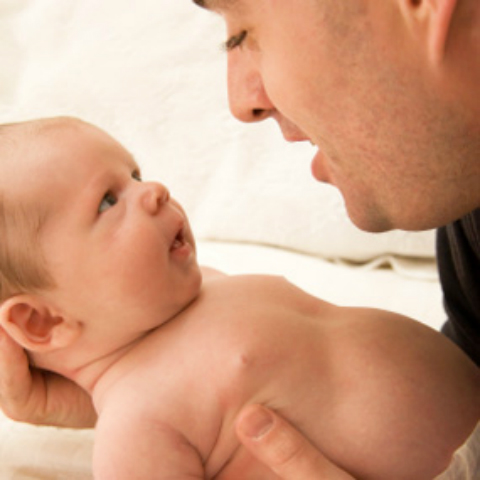Watch Me, Dad!
Even if you just brought your bundle of joy home days ago, you’ll scarcely blink your eyes before your active preschooler crows at the playground: “Watch me, Dad!” But remember that your child watches you. Read on for tips on demonstrating a healthy, active life, so you’ll never need to tell your child, “Do as I say, not as I do.”
Get Your 5-a-Day
You’ll have greater success introducing your child to colorful, crisp and crunchy fruits and vegetables if you regularly eat and enjoy them yourself. Research shows that eating five or more fruits and vegetables every day helps prevent heart disease, cancer, osteoporosis, high blood pressure, obesity, diabetes, and stroke (CDC, 2009).
Berries at breakfast, salad with lunch, and steamed veggies with dinner satisfy you, help keep you slim, and show your child how to eat for health.
Cook Up Fun
Engage your child in the kitchen and garden—even if you live in the city and your garden consists of pots of herbs in a sunny window. Kids love to stir and pour, and their sense of wonder will come alive as they watch tiny shoots emerge from the soil and transform into veggies, herbs, or fruit they enjoy.
Bag Lunch = Good Health and College Funds
Switch from getting your midday meal from the sandwich shop or fast-food joint to packing your own lunch. You’ll log plenty of practice in making healthy, tasty lunches by the time your child marches off to kindergarten. Eating a bagged lunch also will help manage your salt and fat intake and save you money—which you can funnel into a college fund.
Early Childhood Activity
Model an active life for your child from the get-go. Bundle the baby into a carrier and check TrailLink to find a beautiful place to walk in your area. Invest in a jogger that lets you run, walk, or skate while your child takes in the sensory stimulation the outdoors offers.
When your child is big enough to ride in a safe and comfortable bike carrier, cruise around to show them the sights and demonstrate that bicycling is fun.
Go Smoke-Free
Now is the time to let go of your tobacco habit. You’ll feel better, have more energy to play with your child, live longer and—most importantly—you won’t model unhealthy, high-risk behavior.
Get help quitting through smokefree.gov, call 1-800-QUIT-NOW, or talk with your doctor about smoking cessation aids.
Be Friendly
Friends are good for your physical and mental health, according to an analysis of 148 studies published in PLOS Medicine that showed a link between relationships and lower mortality risk (Holt-Lunstad, et al., 2010). Women tend to reap this benefit more than men do, but you can counter that trend.
Join a social, athletic, community, or faith-based group where you can meet others, develop relationships, and show your child that friends are important throughout life.
Show Them How to Snooze
This may sound like illogical advice for a new dad who is up at night with a newborn. However, chronic sleep deprivation is linked to an increased risk for type 2 diabetes, obesity, heart disease, kidney disease, stroke, cancer and depression (NCBI, 2006).
As time passes and your child grows, show them the importance of regular sleep by going to bed and getting up at the same time each day—even on weekends. Aim for seven to eight hours a night
Raise Your Glass (of Water)
According to USDA dietary guidelines, moderate drinking consists of two drinks or less per day for men (USDA, 2010). If you tend to consume more than that—even occasionally—think about cutting back. You’ll lower your risk for liver disease, pancreatitis, some cancers, and high blood pressure, which are associated with overindulging in alcohol (CDC, 2012), and you’ll exhibit a responsible approach to drinking.
Hand Over Good Health
Hand washing is the best and easiest way to prevent the spread of colds and flu. As soon as your child is a toddler, teach them how to lather up and scrub thoroughly:
- before preparing or eating snacks and meals
- after using the bathroom
- after sneezing or coughing into hands
- after each diaper change
- after handling trash or touching a pet
- Wash for 20 seconds, about the time it takes to sing “Happy Birthday” twice. Your child will have fun while developing this healthy habit.
Source: health line



